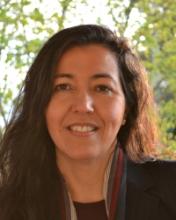Letter From the Chair: Ana M. Gómez-Bravo
As I step in as new chair, I would like to first thank Professor Tony Geist for leaving such a cordial and vibrant department in my hands. When I arrived at the University of Washington over two years ago, I was impressed by the caliber of the research and teaching in Spanish and Portuguese, the friendly work environment, and the dynamism of the faculty and staff. The possibilities afforded by UW and the larger Seattle community have been used to the best advantage in creating a first-rate program.
Our program in collaboration with institutions of secondary education, UW in the High Schools, is in the able hands of Phillip Markley and Sabrina Spannagel and counts as one of the largest in Washington State, as well as in the nation as a whole. Phillip Markley and María Gillman have been instrumental in our collaboration with both the Spanish Center and the Aula Cervantes for the passing of the Seal of Biliteracy in our state. In addition, the heritage learner courses currently being taught and developed by María Gillman and Ana Fernández-Dobao help university and K-12 students. The implementation of these courses counts on outstanding faculty, such as Jorge González and Marilís Mediavilla.
In our classes, alternative activities encourage creative solutions that help students learn, such as the opera student who sang the differences between ser and estar, and others who illustrated grammar points using comic strips (http://faculty.washington.edu/donally/). Other curricular innovations that have enjoyed wide success include the TANDEM initiative that Christina Zubelli and Marilís Mediavilla have created. Through this initiative, students from UW interface in real time with students from Brazil and Mexico in a dedicated computer lab. We have a strong international presence with study abroad programs developed by our faculty in Cádiz (Spain), Cusco (Perú), León (Spain), and Quito (Ecuador).
Our outreach activities include teacher training in the form of a summer program organized by Inma Raneda, in which Spanish teachers from high schools state-wide benefit from Raneda’s expertise in teaching contemporary Spanish culture. University presence within the community at large comes alive every year in the play performed by Anna Witte’s undergraduate play production class. Part of our community commitment and our strong ties to other UW departments and programs is evident in other events, such as Ladino Day, which drew more than 400 people this year. As a result of the partnership with Jewish Studies, a story about my own Converso Cookbook made the national news just recently.
These are just a few examples of how the department fulfills its public, educational and research missions. In the same vein, we see our new PhD program strengthening, with students engaged in a wide variety of research areas, from seventeenth-century Spanish broadsheets to dictatorial Argentina. Our faculty’s publications range from books of poetry by our own Edgar O’Hara, a photo-essay on Seattle-area Lincoln Brigade veterans by Tony Geist, to scholarly books and articles on seventeenth-century commercialized literature in Spain by Donald Gilbert-Santamaría, urbanism and urbanity in late nineteenth- and early twentieth-century Spain by Leigh Mercer, US Hispanic Literature by Lauro Flores, and my own work on textual studies.
Such a lively and energetic department cannot but bode well for a flourishing of even greater things to come. I look forward to many more fantastic developments in our department.
Ana M. Gómez-Bravo
Chair, Spanish and Portuguese Studies
Autumn-Winter 2014
Edited by Irene Hopkins
